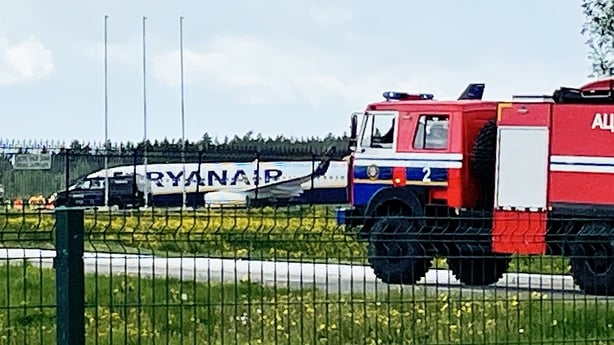Austrian Airlines cancelled a Vienna-Moscow flight this afternoon, saying Russian authorities had not approved a route change for the plane to be able to avoid Belarusian airspace.
The airline said it had suspended flights over Belarusian airspace in line with a recommendation by the European Union Aviation Safety Agency (EASA), making a route change for the Vienna-Moscow flight necessary.
"A change in flight routes must be approved by the authorities. The Russian authorities did not give us this permission," the airline said in a statement to AFP.
Austria's transport ministry confirmed the flight had been cancelled.
"According to our information Russian authorities did not approve a change to the flight route," the ministry said in a statement to AFP.
Russia's transport ministry told AFP that it had "no comment for now".
Belarus sparked global fury by diverting an Athens-to-Vilnius Ryanair plane on Sunday and arresting an exiled dissident in Minsk.
In response, EU leaders on Monday decided to ban Belarusian carriers from European airspace and airports, as well as recommending that EU carriers should also avoid Belarusian airspace.
Austrian Airlines is part of Germany's Lufthansa.
Lufthansa confirmed to AFP that all its airlines were "currently avoiding Belarusian airspace".
Scheduled flights to Moscow and Saint Petersburg continued, it said.
Ireland to ask UN body to investigate Belarus grounding
Earlier, Minister for Transport Eamon Ryan said that Ireland would call on the UN's International Civil Aviation Organization (ICAO) to conduct an impartial probe into the "forced landing" of a Ryanair jet in Minsk.
International condemnation of the scrambling of a fighter jet and the use of what turned out to be a false bomb alert to divert the flight to Minsk and detain opposition Belarusian journalist Roman Protasevich has focused mainly on accusations of state-sponsored hijacking and rights violations.

Europe's aviation regulator said yesterday that Belarus's actions had also cast doubt on its ability to provide safe air navigation.
Some international officials are pushing for an investigation close to the type seen when a plane crashes or something goes technically wrong.
"What we'll be looking for is an investigation under Article 55e of the Convention of the Council [ICAO] and my understanding is that this would be the first such investigation," Mr Ryan said, speaking after a meeting of ministers at the OCED's International Transport Forum.
The OCED group agreed to condemn the "coercive, forced landing".
Article 55e gives the council the power to "investigate, at the request of any contracting state, any situation which may appear to present avoidable obstacles to the development of international air navigation".
Mr Ryan said he would expect such an investigation to be turned around by approximately the end of June.
"We need a full probe, a thorough investigation," he said.

